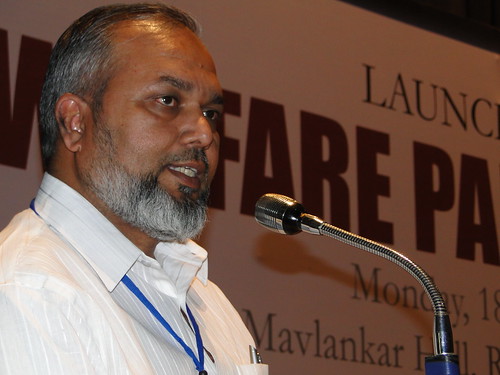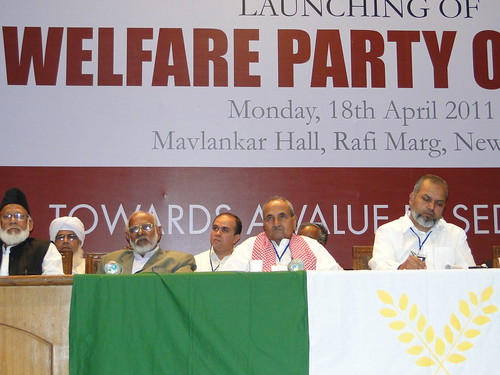By Md. Ali, TwoCircles.net,
New Delhi: A national level political party, Welfare Party of India (WPI), has formally been launched today, April 18, at the political convention here in the national capital at the Constitution club. Interestingly the focus of the convention was to emphasize that the party was neither a political party of the Jamaat-e-Islami nor a Muslim party.
Importantly the top functionaries including the president of the party Mujtaba Farooque and its general secretary Dr. SQR Ilyas, are supposedly one of the most powerful leaders and office bearers of Jamaat-e-Islami. Even till now Mujtaba Farooque is the general secretary of the Jamaat and Ilyas, the media coordinator of JIH, was one the brains behind the idea of the party.

Welfare Party of India president Mujtaba Farooque speaking
During the convention, both the president and the general secretaries repeatedly asserted that the WPI has not been established exclusively for Muslims and the party will fight for the principles of “equality, freedom, justice and fraternity.” But the convention also saw leaders criticizing the mainstream political parties for manipulating Muslims as their vote banks and thereby emphasizing the importance of the WPI as the voice of Muslims.
“The assumption that the Indian Muslims aren’t concerned about their other brothers in the country will be doing great injustice to the second majority of the country,” said Farooque, the president of the WPI.
“It’s not for fun and power that we entered politics. It’s only when every body whom we trusted and became dependent upon, betrayed us and considered its their due right to oppress us, that we felt that now we can’t continue with this kind of political system,” Farooque further added.
The fact that Father Abraham Joseph, a Catholic priest from Kerala has been selected as one of the vice presidents including one non-Muslim, Mrs. Lalitha Naik, a former Karnataka minister, comes as a master stroke for creating a larger secular image for the party. Out of 16 prominent office bearers of the WPI, there are 11 Muslims and 5 non-Muslims.
The convention was attended by several civil society representatives and hundreds of delegates from across the country.
The criminalization, communalization, commercialization and the sectarianization of politics are the biggest evils of our prevailing political culture and the WPI is committed to start a new era of value-based politics, added Farooque. “We might be late in terms of our arrival on the political stage but we promise you that with our genuine and sincere efforts we will try to create an alternative political culture,” added Farooque who is also the general secretary of Jamaat-e-Islami Hind.
The WPI is the result of coming together of several concerned civil society representatives belonging to different backgrounds, communities, classes and social and political groups. Prominent of them include Father Abraham Joseph, Lalitha Nair, a former Karnataka minister and the prominent social activist from the state, Zafarul Islam Khan, Editor, The Milli Gazette fortnightly, Ilyas Azmi, former MP and senior leader of BSP, Prof. Rama Panchal, an eminent social activist from Madhya Pradesh, Prof. Sohail Ahmad Khan, former chairman, Bihar Minority Commission, Prof. Rama Surya Rao, an academician besides several others.
The convention was also attended by dalit leaders including Tej Singh, president, Ambedkar Samaj Party who offered his full support and cooperation to the WPI in future.
With Mujtaba Farooque as its president, the Welfare Party of India has also got five vice-presidents — Ilyas Azmi, Father Abraham Joseph, Maulana Abdul Wahab Khilji, Dr. Zafarul Islam Khan and Mrs. Lalitha Nair.
The five general secretaries of the WPI are Dr. SQR Ilyas, Prof. Sohail Ahmad Khan, Prof. Rama Panchal, Mrs. Khalida Parveen and Mr. PC Hamza. Mr. Abdus Salam M has been selected as its treasurer. The party has started with just 203 members but will soon start a membership drive across the country.
The occasion saw lots of speeches about ideal state of politics. SQR Ilyas, general secretary of WPI, for instance said that, “We wanted to show that even an ordinary person on the street can empower him/herself by becoming part of alternative democratic politics and that’s why launched WPI.”
Mujtaba Farooque, president of WPI said that “at present there are only two categories of people living in India, one is getting poorer day by day. It’s a class which can’t spend even 20 rupees per day and the other is getting only richer and richer. We want to change this oppressive process of marginalization by bringing about change through political participation.”
The Welfare Party aims at realizing a value based welfare state governed by the principles of justice, freedom, equality and fraternity. It will strive for the establishment of the welfare state by recognizing and realizing the right to livelihood.

Leaders of the Welfare Party of India with the flag, Mujataba Farooque (extreme Right)
The other thing high on the agenda of WPI is facilitating “equitable, just and inclusive growth” besides bringing about empowerment of the weak and oppressed through “affirmative action realizing the principle of social justice.”
WPI leaders specifically emphasized the protection of cultural diversity by providing full opportunities to different cultures to thrive and realize the “notion of linguistic, geographical and cultural federalism.
With a middle class and media led campaign against corruption, the disease also found mention in the party press note. WPI claimed to stand against any kind of corruption and will advocate for “mechanisms of accountability and transparency at all levels of public life.”
Sending a positive message to the fairer sex, the party’s aims and objectives specifically talk about women rights in unique words. It mentions facilitating “equal growth and development opportunities for women” so that “their femininity is respected and protected in its true spirit.”
There are around 1200 political parties including 6 national parties, 44 regional parties and 1152 local political outfits in India. It’s yet to be seen whether the Welfare Party of India bring about some change or just increase the count.

